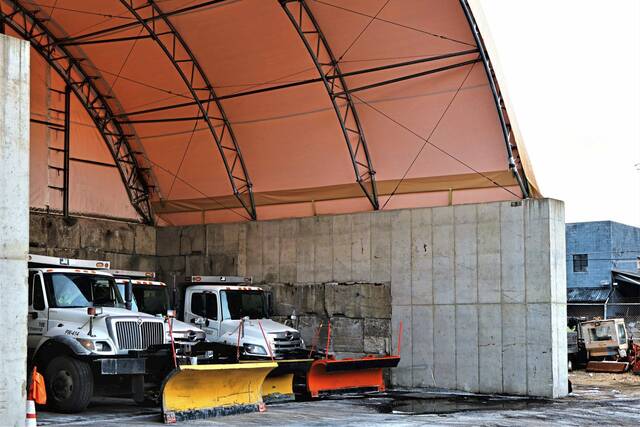Some Pittsburgh City Council members have voiced concerns with the city’s snow plow tracker, which, they said, is often unreliable and misleading.
However, council gave preliminary approval last week to extend a contract with Minnesota-based Quetica for “fleet telematics” and snow route optimization technology, including GPS routing and the technology behind the city’s snowplow tracker.
The proposal would expand the contract through 2024, with a price tag of more than $222,000 per year.
In a preliminary vote Wednesday, Council President Theresa Kail-Smith voted against the measure. Councilman Anthony Coghill and Councilwoman Deb Gross abstained.
All other council members voted in favor of the measure, which will be ready for a final vote this week.
The contract calls for the purchase and installation of devices for environmental services vehicles and extend the contract for existing services, said Brandon Walton, the city’s fleet manager.
Some council members, however, questioned whether they should continue to utilize the portion of their contract that maintains the snowplow tracker. It’s an online tool that, in theory, shows residents where snowplows have cleared streets in their neighborhoods.
The problem, several council members said, is the tracker is often inaccurate.
“In the very beginning of each snowy season, the snowplow tracker works wonderfully,” Councilwoman Erika Strassburger said. “And then halfway through the winter season, you can’t trust it anymore.”
Councilwoman Deb Gross said the tracker may be a useful tool for internal use among city leaders and snow removal crews, but questioned whether it ought to be publicly available as it has been during the last several winters.
Gross said she and many other city residents are skeptical of the information they see on the online tracker.
“The concept is really neat,” she said. “But if we know it might not be accurate, then maybe we’re putting out misinformation.”
Gross said she’d like to see council members consider whether they could nix that portion of the contract, especially if it comes with a substantial cost.
Related:
• New public works facility won’t be ready to help Pittsburgh’s South Hills neighborhoods this winter
• Pittsburgh sets goal to clear roads within 24 hours of snowfall
• Pittsburghers skeptical of mayor’s snow removal goals
• Pittsburgh Snow Plow Tracker App (currently disabled)
Walton estimated that the snowplow tracker portion of the contract was about $55,000, but could not confirm a specific number during Wednesday’s council meeting.
Councilman Anthony Coghill said he’d like to see that money put to better use to tackle the city’s snow removal issues. The cost of operating the snowplow tracker, he said, could perhaps purchase another snowplow instead.
Coghill, who represents a district that does not currently have its own Department of Public Works facility with plows and salt, said the tracker is particularly problematic for him.
Residents in neighborhoods he represents — including Beechview, Brookline, Carrick, Overbrook and Bon Air — may see that there are no trucks in their district on the tracker, even when it’s working. That’s because trucks have to leave the district to get salt elsewhere, he said, but residents sometimes think it means they’re not working to clear streets in their neighborhoods at all.
He noted general glitches with the system, like the fact that it doesn’t track trucks traveling at less than five miles per hour or driving in reverse, which some trucks do to better handle steep hills.
The tracker also can’t differentiate between when trucks are simply driving on a street and when they’re using their plow or dropping salt, Walton said.
Still, Walton said, the information displayed on the snowplow tracker typically is “mostly accurate.” He also noted that the city has updated some equipment in hopes to make the information more accurate this winter.
Council President Theresa Kail-Smith raised broader questions about the snow route optimization technology’s usefulness. The GPS may show drivers its preferred route, she said, but experienced drivers often know of better routes from their years of driving the city’s streets.
“I feel like what they always want from us is to trust they know how to do their job,” Kail-Smith said of the plow drivers. “Instead, they feel micromanaged during this process. I think we’re not respecting their institutional knowledge.”
She also pointed out that the system routing drivers stopped working during several snowstorms last year.








